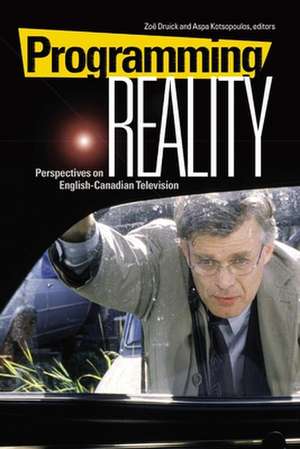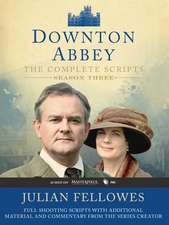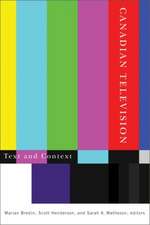Programming Reality: Film and Media Studies
Editat de Zoe Druick, Aspa Kotsopoulosen Limba Engleză Paperback – 30 apr 2007
Din seria Film and Media Studies
-
 Preț: 171.65 lei
Preț: 171.65 lei -
 Preț: 238.28 lei
Preț: 238.28 lei -
 Preț: 205.68 lei
Preț: 205.68 lei -
 Preț: 237.41 lei
Preț: 237.41 lei -
 Preț: 503.15 lei
Preț: 503.15 lei -
 Preț: 272.80 lei
Preț: 272.80 lei -
 Preț: 277.00 lei
Preț: 277.00 lei - 19%
 Preț: 529.70 lei
Preț: 529.70 lei -
 Preț: 271.23 lei
Preț: 271.23 lei -
 Preț: 284.34 lei
Preț: 284.34 lei -
 Preț: 294.74 lei
Preț: 294.74 lei -
 Preț: 335.28 lei
Preț: 335.28 lei -
 Preț: 313.15 lei
Preț: 313.15 lei -
 Preț: 260.25 lei
Preț: 260.25 lei -
 Preț: 293.81 lei
Preț: 293.81 lei -
 Preț: 200.35 lei
Preț: 200.35 lei -
 Preț: 156.72 lei
Preț: 156.72 lei - 23%
 Preț: 561.74 lei
Preț: 561.74 lei -
 Preț: 282.27 lei
Preț: 282.27 lei - 23%
 Preț: 780.83 lei
Preț: 780.83 lei -
 Preț: 134.49 lei
Preț: 134.49 lei -
 Preț: 143.06 lei
Preț: 143.06 lei -
 Preț: 155.56 lei
Preț: 155.56 lei - 27%
 Preț: 425.40 lei
Preț: 425.40 lei
Preț: 328.76 lei
Nou
62.91€ • 65.69$ • 51.95£
Carte tipărită la comandă
Livrare economică 15-29 aprilie
Specificații
ISBN-10: 1554580102
Pagini: 354
Ilustrații: b/w photos
Dimensiuni: 155 x 229 x 23 mm
Greutate: 0.52 kg
Editura: Wilfrid Laurier University Press
Seria Film and Media Studies
Cuprins
Table of Contents for
Programming Reality: Perspectives on English-Canadian Television edited by Zoë Druick and Aspa Kotsopoulos
Introduction | Zoë Druick and Aspa Kotsopoulos
Part One: Narrating Nation
Reenacting Canada: The Nation State as an Object of Desire in the Early Years of Canadian Broadcasting | David Hogarth
Representing National History on Television: The Case of Canada: A People's History | Lyle Dick
Canadian Idols? CBC's The Greatest Canadian as Celebrity History | Julie Rak
Canadian Idol and the Myth of National Identity | Michele Byers
Hockey Dreams: Making the Cut | Derek Foster
Laughing at Authority or Authorized Laughter? Canadian News Parodies | Zoë Druick
Whose Child Am I? The Quebec Referendum and Languages of Affect and the Body | Marusya Bociurkiw
Part Two: Making Citizens
Public Broadcasting/National Television: CBC and the Challenges of Historical Miniseries | Aspa Kotsopoulos
History as Edutainment: Heritage Minutes and the Uses of Educational Television | Katarzyna Rukszto
Education and Entertainment: The Many Reals of Degrassi | Michele Byers
Haunting Public Discourse: The Representation of Residential Schools in CBC Television Drama | Mary Jane Miller
Part Three: Mapping Geographies
Representations of Urban Conflict in Moccasin Flats | John McCullough
Da Vinci's Inquest: Postmortem | Glen Lowry
Imagining National Citizens in Televised Toronto | Jen VanderBurgh
Realism and Community in the Canadian Soap Opera: The Case of Train 48 | Sarah A. Matheson
Human Cargo: Bridging the Geopolitical Divide at Home in Canada | Kirsten Emiko McAllister
Contributors
Index
Contributors
Marusya Bociurkiw is assistant professor of media theory in the School of Radio and Television Arts at Ryerson University in Toronto. She is the author of four literary books, including Comfort Food for Breakups: The Memoir of a Hungry Girl (Arsenal Pulp Press, 2007). She has been producing films and videos in Canada for the past fifteen years, including, most recently, Flesh and Blood: A Journey between East and West. Her monograph on Canadian television, Feeling Canadian: Nationalism and Affect on Canadian Television, is forthcoming from Wilfrid Laurier University Press.
Michele Byers is assistant professor in Sociology and Criminology at Saint Mary's University. She has written extensively on television, youth, and identity. In 2001, she was awarded a SSHRC grant to study the Degrassi series and the production of youth and Canadian identity. In 2004, she was awarded a second SSHRC grant to engage in a broader study of television, film, and the production of Canadian youth cultures. She is editor of Growing Up Degrassi: Television, Identity and Youth Cultures (Sumach Press, 2005).
Lyle Dick is the West Coast historian with Parks Canada in Vancouver. He is the author of 70 publications on topics in Canadian and American history, historiography, and Arctic history, including the book Muskox Land: Ellesmere Island in the Age of Contact (University of Calgary Press, 2001). He was awarded the Harold Adams Innis Prize for Canada's best English-language book in the social sciences in 2003. His published work includes several detailed investigations into the relationships of narrative form and Canadian history, including earlier articles on the books and visual content of the CBC series Canada: A People's History.
Zoë Druick is associate professor in the School of Communication at Simon Fraser University, where she teaches courses in media, film, and cultural studies. She is the author of Projecting Canada: Documentary Film and Government Policy at the National Film Board (McGill-Queen's University Press, 2007) and has published articles on documentary film, educational media, and cultural policy in Television and New Media, Studies in Documentary Film, Canadian Journal of Film Studies, and Canadian Journal of Communication. Her current work involves an investigation of the links between documentary and democracy.
Derek Foster is assistant professor in the Department of Communications, Popular Culture and Film at Brock University. His PhD dissertation (Carleton University, School of Journalism and Communication, 2004) studied the evolution of squeegeeing as a controversial social issue through the lens of rhetorical theory. His recent publications focus on a wide variety of communication media studied as visual rhetoric and contesting discourses surrounding reality television.
David Hogarth is associate professor in Communication Studies at York University. His research is concerned with the history and current state of documentary in Canada and worldwide. He is the author of Documentary Television in Canada: From National Public Service to Global Marketplace (McGill-Queen's University Press, 2002) and Realer Than Reel: Global Dimensions in Documentary (University of Texas Press, 2006). He is now researching the political economy of independent documentary production.
Aspa Kotsopoulos is senior policy analyst in Television Policy and Applications at the Canadian Radio-television and Telecommunications Commission (CRTC). In 2004 she received her PhD in Communications from Simon Fraser University, where her dissertation was nominated for a Governor General's award. She has published articles about Canadian television in various journals and anthologies, and has taught courses in film and media studies.
Glen Lowry teaches in critical and cultural studies at Emily Carr Institute for Art + Design + Media in Vancouver. A specialist in contemporary Canadian literature and culture, he edits West Coast Line. His recent published work looks at the limits of cultural nationalism in relation to racialized writing, 20th-century poetics, photography, and contemporary art. He is currently working on a collaborative Research Creations project on the uncanny mirroring of Vancouver's urban waterfront in the desert West of Dubai, United Arab Emirates.
Sarah A. Matheson is assistant professor in the Department of Communications, Popular Culture and Film at Brock University. Her research and teaching interests are in film and television studies, with a recent focus on reality television in Canada and the U.S. and issues surrounding taste and popular culture. She has published several articles on the representation of Toronto on English-Canadian television.
Kirsten Emiko McAllister is assistant professor in the School of Communication at Simon Fraser University. She has published in the areas of cultural memory, visual culture, and political violence, focusing on Japanese Canadian internment camps. Her more recent research focuses on refugees and discourses of inclusion and exclusion. Some of her publications include articles in Visual Studies and Cultural Values and a book co-edited with Annette Kuhn, Locating Memory: Photographic Acts (Berghahn, 2006).
John McCullough teaches in the Department of Film at York University. He has a PhD in social and political thought and was the first coordinator of the graduate programs in interdisciplinary studies in fine arts at the University of Regina. His current research includes analysis of popular Hollywood films, Canadian regional television production, and First Nations in film and television.
Mary Jane Miller is Professor of Dramatic Arts Emerita at Brock University. She is the author of Turn Up the Contrast: CBC Television Drama since 1952 (University of British Columbia Press and CBC, 1987) and Rewind and Search: Conversations with Makers and Decision Makers of CBC Television Drama (McGill-Queen's University Press, 1996). She is completing the forthcoming book Outside Looking In for McGill-Queen's University Press, about the representation of First Nations people in series television.
Julie Rak is associate professor in the Department of English and Film Studies at the University of Alberta. She is the author of Negotiated Memory: Doukhobor Autobiographical Discourse (2005) and the editor of Auto/biography in Canada: Critical Directions (2005). She is co-editor (with Jeremy Popkin) of On Diary, a new translation of recent essays by Philippe LeJeune (University of Hawaii Press, 2008) and co-editor (with Andrew Gow) of Mountain Masculinity: The Life and Writings of Nello (Tex) Vernon Wood on the Canadian Rockies, 1911-1938 (Athabasca University Press, 2008). She is the editor of a special issue of The Canadian Journal of American Studies on popular auto/biography (forthcoming 2008). Julie has published on popular culture, Canadian culture and autobiography theory most recently in English Studies in Canada, biography, and Life Writing. Her current book project is about mass-produced memoir and biography in print and on television in North America.
Katarzyna Rukszto is assistant professor in the Department of Sociology at Wilfrid Laurier University. Her current research examines representational politics of museums and heritage sites, particularly those that focus on military history, war, and national identity. She is also revising a book manuscript on the Heritage Minutes.
Jen VanderBurgh is a SSHRC Postdoctoral Fellow in the Department of Film and Media at Queen's University, where she working on a manuscript that compares national approaches to archiving and teaching television. Her other research concerns representations of urbanity as a problematic of nation, culture, and technology in Canadian film and television. She has published in the Canadian Journal of Film Studies, Topia, Quebec Studies, and the Encyclopedia of the Documentary Film.


